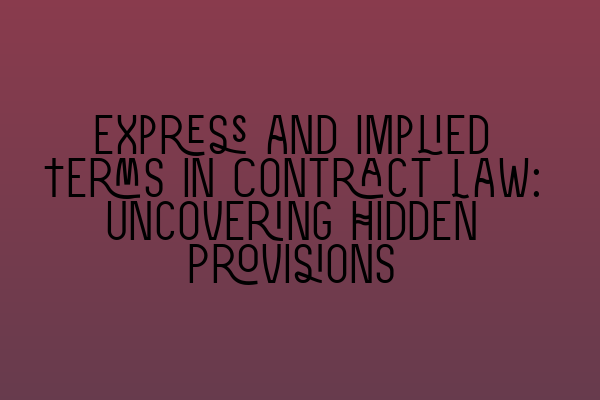Express and Implied Terms in Contract Law: Uncovering Hidden Provisions
Contracts are the cornerstone of business transactions and legal agreements. They establish the rights and obligations of the parties involved, providing certainty and security. When drafting or entering into a contract, it is crucial to understand the concept of express and implied terms, as they can greatly impact the enforceability and interpretation of the contract. In this article, we will delve into the world of express and implied terms, uncovering hidden provisions that may affect your contractual obligations.
Express Terms: The Foundation of Contractual Obligations
Express terms are those that are explicitly agreed upon and stated in the contract. They can be either orally agreed upon or written down in the written contract itself. These terms are typically specific and detailed, leaving no room for interpretation or ambiguity.
When drafting a contract, it is important to ensure that all material terms are expressly included. Material terms are those that go to the root of the agreement and are essential for the contract to be valid. Failure to include material terms may render the contract unenforceable.
Express terms can cover a wide range of provisions, including the price of the goods or services, delivery dates, payment terms, warranties, and conditions. Parties should carefully consider and negotiate these terms to protect their respective interests.
Implied Terms: Unveiling Hidden Provisions
Implied terms, on the other hand, are not explicitly stated in the contract but are rather inferred by the courts or specified by legislation. These terms are not agreed upon by the parties, but are implied to give effect to the intentions of the parties or to ensure fairness and reasonableness.
There are two main types of implied terms: terms implied by law and terms implied by fact.
Terms implied by law are terms that are automatically included in certain types of contracts, regardless of whether the parties explicitly agreed to them. For example, the Sale of Goods Act 1979 implies terms into contracts for the sale of goods, such as the requirement that the goods must be of satisfactory quality and fit for their intended purpose.
In addition, certain contracts have terms implied by custom or usage. These are terms that are commonly understood and applied in a particular trade or industry. For instance, in the construction industry, it is customary for the contractor to have a duty to exercise reasonable skill and care in carrying out the works.
Terms implied by fact, on the other hand, are terms that are inferred by the courts based on the conduct and circumstances of the parties. The courts will examine the intentions of the parties and the factual matrix surrounding the contract to determine whether certain terms should be implied.
Implied terms can serve various purposes, including filling gaps in the contract, ensuring the contract’s commercial efficacy, and protecting the reasonable expectations of the parties. They can cover a wide range of matters, such as the duty of confidentiality, the duty of good faith, and the duty to provide adequate instructions.
Uncovering Hidden Provisions: The Importance of Understanding Implied Terms
Understanding and being aware of implied terms is crucial when entering into a contract. These hidden provisions can significantly impact your rights, obligations, and liability.
If you are drafting a contract, it is important to anticipate and address potential implied terms. By explicitly including relevant provisions in the contract, you can avoid uncertainty and potential disputes down the line.
If you are entering into a contract, it is essential to carefully review the terms and seek legal advice if necessary. Understanding the implied terms can help you assess the fairness and reasonableness of the contract and make an informed decision.
In addition to express and implied terms, it is also important to consider other aspects of contract law, such as frustration, interpretation of contractual clauses, consideration, and different types of agreements. These related articles will provide you with further insights into these important topics:
– Exploring the Impact of Frustration on Contractual Obligations: Legal Insights
– Interpreting Contractual Clauses: Unlocking the Hidden Meanings
– Legal Aspects of Business Contracts: Key Considerations for Entrepreneurs
– Agreements in Contract Law: Understanding Its Various Types
– Essentials of Consideration: Understanding the Basis of Contractual Exchange
In conclusion, express and implied terms play a vital role in contract law, shaping the obligations and rights of the parties. Express terms provide certainty and clarity, while implied terms fill the gaps and ensure fairness and reasonableness. By understanding these principles and seeking legal advice when necessary, you can uncover hidden provisions and navigate the complex world of contracts with confidence.
